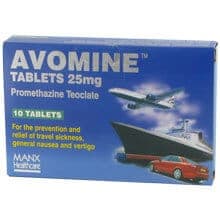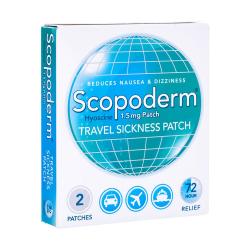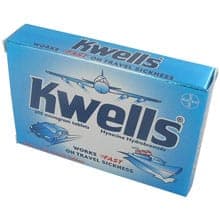Login to your account
- Prescription included
- Genuine medication
- All-inclusive service - No hidden fees
- Free next-day delivery
Motion Sickness
Get motion sickness medication with an online prescription
Motion sickness, sometimes known as travel sickness, is a name given to a combination of symptoms which are caused by travelling on planes, boats, cars or coaches. Symptoms can often include dizziness, nausea and sickness, and can cause discomfort to people who experience motion sickness. It can sometimes be avoided by using distraction techniques, particularly in children. However, some people may need to use medication in order to prevent symptoms from occurring.
There are different types of travel sickness medication available to buy online at euroClinix after completing an online consultation for one of our doctors to review. Once your order has been approved you will be issued an online prescription and a registered pharmacy will dispatch your medication for next day delivery.
Available Treatment(s)

- Easy-to-use motion sickness treatment
- Can treat and prevent nausea
- Available with free delivery for your convenience

- Effective relief for travel sickness
- Provides relief for up to 72 hours
- Easy to apply patch form

- Reduces the risk of motion sickness
- Limits symptoms of nausea, vomiting and drowsiness
- Easy dissolvable pill
What is motion sickness?
Travel sickness symptoms can occur when you travel by car, plane, train and ship. The medical term for travel sickness is kinetosis which is known for causing confusion between the way the eyes see motion and the way the body senses it.
The most common form of motion sickness is sea sickness, and the word nausea itself stems from the Ancient Greek word ‘naus’ meaning nautical. Research has estimated that up to 25% of passengers on any given cruise ship will develop sea sickness.
When you walk around the body propels itself forwards and the inner ear acts as a spirit level to balance itself. This is not the case when travelling by vehicle because the body is essentially still when the eyes can see movement.
Some factors can make you more susceptible to it, but it is entirely treatable and preventable in most cases.
What causes motion sickness?
There are multiple theories for why motion sickness occurs. One of the most popular suggests that it occurs when there is a mismatch of information throughout your vestibular system, a sensory system that is responsible for information on motion, spatial position and head position. Your brain receives signals from motion-sensing parts of your body (i.e your eyes, inner ears, muscles and joints). When you’re travelling, these body parts will detect and sense different information between them.
For example when you’re travelling by car, your eyes can see that trees are moving past you and your inner ears can detect movement. However, your muscles don’t detect any movement as you’re sitting still. The brain receives these conflicting signals and therefore can’t decide whether you’re stationary or moving, which causes you to feel sick.
Travel sickness is also caused by the parts of the inner ear responsible for balance, known as the semicircular canals, being overstimulated from excessive motion.
Multiple scenarios can cause these to happen, including:
- several modes of transport such as: car, plane, boat, train or coach
- amusement park rides and roller coasters
- reading whilst travelling
- virtual reality (VR)
- video games and films
Motion sickness can also sometimes be caused by smells such as petrol or exacerbated by the anxiety of travelling. It is more common in children who usually grow out of it but some adults can also experience the condition, particularly in certain circumstances such as during an excessively rocky boat ride or form driving on long roads with lots of curves.
Whilst anybody can be susceptible to motion sickness, there are some factors mean you have an increased susceptibility to motion sickness, such as in:
- those with a family history of motion sickness
- those who take hormonal birth control (e.g the pill, patch, ring or intrauterine system)
- those who have an inner ear disorder (e.g Meniere’s disease)
- women during their menstrual cycle
- those who have migraines
- those who have parkinson’s disease
- pregnant women
- people who take certain medications such as antidepressants, anti-inflammatory and antibiotics
What are the symptoms of motion sickness?
The most common travel sickness symptoms are nausea and vomiting. Others can include:
- nausea and vomiting
- excess saliva
- cold sweat
- feeling dizzy
- pale colour of skin
- shallow, fast breathing or rapid gulping for air
- headache
- tiredness or fatigue
- irritability and difficulty concentrating
Can I avoid motion sickness when travelling?
In mild cases of motion sickness, there are some simple techniques you can do regardless of mode of transport to help reduce the risk of getting travel sick such as:
- avoid large, spicy or heavy meals before setting off on your journey
- avoid drinking alcohol or caffeine before or during your trip
- making sure you’re well-rested for the day of the journey
- have light and bland snacks with you
- drinking plenty of water
There are also some specific things you can do for each means of transport.
How to avoid airsickness:
- pick a seat in the middle or front of the plane where the plane is the most stable
- try not to read or look at digital screens during the flight
- listen to music to distract you
- stay relaxed by closing your eyes and deep breathing or meditating
- take frequent breaks to stretch your legs
How to avoid car sickness:
- sit in the front seat of the car, avoid sitting in the back seat
- look straight ahead at a fixed point, such as the horizon
- open a window to get some fresh air
- take breaks to walk and get fresh air on long car journeys
How to avoid seasickness:
- go out onto the deck
- focus on something still like the horizon
- don’t focus on the waves
- when you have to be inside, stay in the middle of the boat
- try and lie down, close your eyes and relax
How to avoid train sickness:
- find or prebook a seat in the middle of the train where it is more stable
- remain seated if possible
- try get fresh air by sitting near a door or crack open a window
- look forwards towards the horizon out of the window
Although these techniques may relieve the symptoms of travel sickness, more serious symptoms of motion sickness can be treated with medication.
How do I relieve motion sickness symptoms?
The best motion sickness treatment will depend on the individual and there are a variety of treatments available, from natural to prescription medications.
Motion sickness medicine
Medication to treat motion sickness is different to other ailments as medication is best taken before travel. This is because digestion can impair the antiemetic effects of the drug.
The most common drug available specifically for motion sickness is called hyoscine hydrobromide or scopolamine. It is available as travel sickness tablets, sold under the brand names Kwells and Joy-rides for both adults and children. You can take the tablets 30 minutes before or as soon as you start to feel travel sick. Hyoscine is also available as a transdermal patch called Scopoderm. You stick the patch to the skin behind the ear and can be left on for up to 72 hours.
The other main treatments for motion sickness are certain antihistamines such as:
- Promethazine (Avomine),
- Dimenhydrinate (Dramamine)
- Diphenhydramine (Benadryl)
- Meclizine (Bonine)
- Cyclizine
These antihistamines work by blocking the effects of the brain whilst travelling, which prevents the symptoms of motion sickness. Both hyoscine and antihistamines are available on prescription and over-the-counter for motion sickness.
They are not suitable for everyone and can cause side effects such as drowsiness and dry mouth. You should speak to a healthcare professional before purchasing to make sure you’re suitable to take them.
Alternative treatments
There are several natural remedies for treating and preventing motion sickness. They may be better for those who can’t take tablets or who are worried about side effects.
Ginger and peppermint have both been found to be great natural remedies for nausea, and many use them to help with their motion sickness. You can buy supplements and oils formulated for travel sickness, or you can simply bring some ginger biscuits, ginger beer or peppermint sweets with you on the journey.
Another natural alternative to tablets are acupressure bands and are available under several brands, one of the more notable being Sea-Band. They work by targeting a specific pressure point on the wrist that helps to reduce nausea and vomiting.
Can I buy prescription medication for motion sickness online?
You can purchase motion sickness treatments such as Kwells, Avomine and Scopoderm online here at euroClinix. All you have to do is fill out a quick medical consultation which will be reviewed by one of our registered doctors. Once they have approved you for treatment, your medication will be dispensed and dispatched to you with free next-day delivery.
Select
medicationFill out a short
medical formDoctor issues
prescriptionMedication sent
from pharmacy
